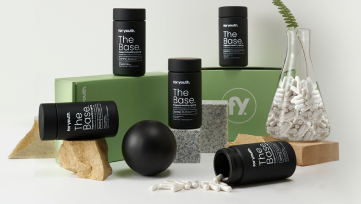Resveratrol's Impact on Liver Enzymes and Detoxification


 Shop our Resveratrol
Shop our Resveratrol 
Resveratrol, a naturally occurring compound found in various plants, has garnered significant attention in the scientific community for its potential impact on liver health. This polyphenolic substance exhibits remarkable antioxidant properties and has been shown to influence liver enzymes and detoxification processes. As liver disorders continue to rise globally, understanding the mechanisms by which resveratrol interacts with hepatic functions becomes increasingly vital. While initial studies have yielded promising results, the full extent of resveratrol’s benefits and its potential therapeutic applications remain a subject of ongoing research and debate.
In light of the rising interest in natural supplements, exploring the differences between trans-resveratrol vs resveratrol is crucial for consumers seeking to optimize their liver health through dietary choices. Renowned researchers like David Sinclair have highlighted resveratrol’s anti-aging potential, linking it not only to liver health but also to longevity. Besides its anti-aging properties, resveratrol is also being carefully studied for weight loss benefits, and its role in promoting cardiovascular health. The compound’s impact on cancer is another area under scrutiny, with promising research suggesting that resveratrol could play a part in cancer prevention. Additionally, its anti-inflammatory power could make it beneficial for individuals with chronic liver inflammation. Scientists are also investigating resveratrol as a potential diabetes aid, given its various metabolic benefits. With the aim of not just treating but also preventing disease, the prospect of using resveratrol to extend lifespan is an exhilarating frontier in the field of nutraceuticals.

Get The Latest On Longevity Delivered To Your Inbox.
By signing up, you consent to receive For Youth emails
Understanding Resveratrol
Resveratrol, a polyphenolic compound found in various plants, has gained significant attention in the scientific community for its potential health benefits and effects on cellular processes.
This naturally occurring antioxidant is primarily found in red wine, grapes, berries, and peanuts. Resveratrol has demonstrated anti-inflammatory, anticarcinogenic, and cardioprotective properties in numerous studies, making it a subject of interest in nutritional and medical research.
Resveratrol’s Antioxidant Properties
While liver enzymes serve as indicators of hepatic health, certain compounds like resveratrol can influence these markers through their potent antioxidant properties.
Resveratrol, a polyphenol found in grapes and berries, exhibits strong free radical scavenging abilities. It neutralizes harmful oxidative species, reducing cellular damage and inflammation in the liver.
This antioxidant activity helps maintain liver enzyme levels within normal ranges, potentially improving overall hepatic function.
Enhancing Liver Detoxification Pathways
In addition to its antioxidant properties, this polyphenol compound plays a significant role in enhancing the liver’s natural detoxification processes.
Resveratrol boosts liver function by:
- Upregulating phase II detoxification enzymes
- Increasing glutathione levels, an essential antioxidant for detoxification
- Enhancing the activity of key liver enzymes like CYP3A4
These effects collectively improve the liver’s capacity to neutralize and eliminate harmful toxins, supporting overall health and well-being.
Clinical Studies and Evidence

 Shop our Resveratrol
Shop our Resveratrol 
Resveratrol’s impact on liver function has been the subject of numerous clinical studies, providing substantial evidence for its hepatoprotective effects. Research has demonstrated resveratrol’s ability to reduce liver enzyme levels, particularly ALT and AST, in patients with non-alcoholic fatty liver disease.
Additionally, studies have shown improvements in liver steatosis and inflammation markers. These findings support resveratrol’s potential as a therapeutic agent for liver disorders.
Incorporating Resveratrol Into Diet
Incorporating resveratrol into one’s diet can be achieved through various natural food sources and dietary supplements, offering individuals a practical approach to potentially benefit from its hepatoprotective properties.
Key ways to increase resveratrol intake include:
- Consuming red grapes, berries, and peanuts
- Drinking moderate amounts of red wine
- Taking resveratrol supplements under medical supervision
These methods allow for flexible integration of resveratrol into daily routines, potentially supporting liver health and detoxification processes.
For Youth – Learn More About Us
For Youth demystifies the science of longevity, making it accessible to everyone. With the view of considering aging as a “disease” that can be cured, we aim to help individuals slow down or even reverse aging at a cellular level, ultimately leading to a healthier and longer life.
Aging is the underlying cause of various health issues, ranging from minor problems like wrinkles to severe diseases like Alzheimer’s or cancer. By slowing down the aging process, one can significantly improve their overall health and well-being.
For Youth offers a biological age test and a range of science-backed, lab-tested, and carefully sourced supplements, such as NMN or Resveratrol, to help you monitor and counteract the effects of aging.
Discover The Grape – Resveratrol by For Youth

 Shop our Resveratrol
Shop our Resveratrol 
Learn more about The Grape – Resveratrol Singapore
Scientifically supported as an anti-aging supplement, resveratrol is a naturally occurring compound found in grape skin that offers numerous health benefits. Activating longevity genes helps protect your cells and contributes to a longer, healthier life. Our 99% pure resveratrol formula also boosts energy levels, provides antioxidant support, promotes cardiovascular health, and assists in addressing other aging-related issues.
Energy Enhancement:
Resveratrol mimics the effects of calorie restriction, activating genes called sirtuins that protect DNA and influence epigenetics. When combined with NAD+ boosters like NMN, which fuel these sirtuins, resveratrol works synergistically to increase your energy levels.
Antioxidant Properties:
As a potent polyphenol and natural antioxidant, resveratrol is found in high concentrations in grape skin, peanuts, berries, and Japanese knotweed (Hu Zhang). Antioxidants help protect your cells from free radicals that may lead to diseases.
Aging-Related Benefits:
Resveratrol offers a wide array of longevity advantages, including improved cardiovascular health, reduced inflammation, decreased bad cholesterol levels, enhanced skin health, and support for brain function, among other aging-related issues.








